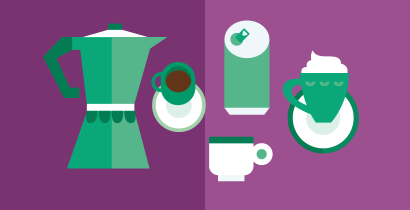EFSA opinion on the safety of caffeine
Last Updated : 23 June 2015On 27th May 2015, the European Food Safety Authority (EFSA) published its scientific opinion on the safety of caffeine consumed through the diet. The report, prepared by the EFSA Panel on Dietetic Products, Nutrition and Allergies (NDA), concluded that for healthy adults, with the exception of pregnant women, single doses of caffeine up to 200 mg (approximately 2 ½ espressos or 4 cups of tea) and total daily caffeine consumption of up to 400 mg are safe.
Following a request from the European Commission, EFSA asked the NDA Panel to deliver a scientific opinion on the safety of caffeine. The Panel assessed the effects of caffeine intake in adults, the elderly, pregnant and breastfeeding women, children and adolescents, and people performing physical exercise; looking first at the effects of single doses of caffeine and then at habitual daily consumption. EFSA also looked at the effects of consuming caffeine in combination with alcohol or in combination with common ingredients in energy drinks.
Caffeine is a naturally-occurring substance found in some plant-based food and drink ingredients, such as tea leaves and coffee or cocoa beans. It is added to other food and drink products like cola-based soft drinks, energy drinks and sweets. Caffeine is also available in tablet-form, marketed as a product for relieving the symptoms of fatigue. A known effect of caffeine is its ability to act as a mild diuretic (causing the body to lose water). It has also been shown to affect sleep and sleep patterns, at doses of around 100 mg in certain individuals, particularly when consumed close to bedtime.
EFSA’s scientific opinion provided information on the concentrations of caffeine that are found in common caffeine-containing food and beverages*:
- Tea (220 ml) – 50 mg
- Coffee (filter, one cup, 200 ml) - 90 mg
- Coffee (espresso, 60 ml) – 80 mg
- Standard can of energy drink (250 ml) – 80 mg
- Standard can of cola (355 ml) – 40 mg
- A bar of plain chocolate (50 g) – 25 mg
- A bar of milk chocolate (50 g) – 10 mg
*Caffeine content in coffee and chocolate can vary depending on the manufacturing process, raw ingredients, product composition and other factors.
The main source of caffeine intake for adults and the elderly in the EU is coffee, with the exception of the UK and Ireland where the main source is tea. In healthy adults and the elderly, single doses of caffeine of up to 200 mg (approximately 2 ½ espressos or 4 cups of tea) do not raise any safety concerns. For regular consumption, EFSA concluded that caffeine consumption up to 400 mg over the course of 24 hours is not likely to cause any harm to the adult consumer. These levels are also safe for healthy adults performing intense physical exercise.
Single doses of caffeine of up to 200 mg are considered unlikely to mask the feeling of intoxication in people drinking alcohol. This level of caffeine intake is safe at blood alcohol levels (BAC) of 0.08% (above 0.05%, the level which you are considered unfit to drive in most EU countries). It is also considered safe to combine moderate alcohol consumption with habitual caffeine consumption of up to 400 mg per day.
The NDA Panel also assessed the effects of caffeine in combination with common ingredients of energy drinks (specifically taurine and D-glucorono-γ lactone) and concluded that it is safe for healthy adults to consume caffeine with other energy drink ingredients at the levels that they are found in energy drinks.
For pregnant and breastfeeding women, EFSA concludes that regular caffeine consumption of up to 200 mg per day are safe for the unborn child or breastfed infant. This is equivalent to just over 2 cups of filter coffee or 4 cups of tea.
The main source of caffeine intake for children and toddlers was chocolate beverages, while chocolate, coffee, cola, energy drinks and tea were all significant contributors for adolescents. Based on the fact that caffeine clearance (the speed at which caffeine is eliminated from the body) in children and adolescents is at least as fast as in adults, EFSA has proposed a conservative safety level of 3 mg/kg body weight for habitual consumption for children and adolescents.



